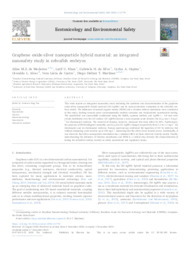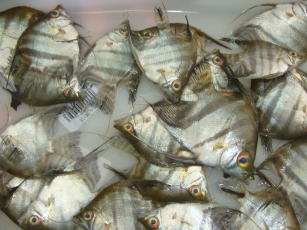Graphene oxide-silver nanoparticle hybrid material: an integrated nanosafety study in zebrafish embryos.
Graphene oxide-silver nanoparticle hybrid material: an integrated nanosafety study in zebrafish embryos.
Author(s): MEDEIROS, A. M. Z.; KHAN, L. U.; SILVA, G. H. da; OSPINA, C. A.; ALVES, O. L.; CASTRO, V. L. S. S. de; MARTINEZ, D. S. T.
Summary: Abstract: This work reports an integrated nanosafety study including the synthesis and characterization of the graphene oxide-silver nanoparticle hybrid material (GO-AgNPs) and its nano-ecotoxicity evaluation in the zebrafish embryo model. The influences of natural organic matter (NOM) and a chorion embryo membrane were considered in this study, looking towards more environmentally realistic scenarios and standardized nanotoxicity testing. The nanohybrid was successfully synthesized using the NaBH4 aqueous method, and AgNPs (~ 5.8 nm) were evenly distributed over the GO surface. GO-AgNPs showed a dose-response acute toxicity: the LC50 was 1.5 mg L-1 for chorionated embryos. The removal of chorion, however, increased this toxic effect by 50%. Furthermore, the presence of NOM mitigated mortality, and LC50 for GO-AgNPs changed respectively from 2.3 to 1.2 mg L-1 for chorionated and de-chorionated embryos. Raman spectroscopy confirmed the ingestion of GO by embryos; but without displaying acute toxicity up to 100 mg L-1, indicating that the silver drove toxicity down. Additionally, it was observed that silver nanoparticle dissolution has a minimal effect on these observed toxicity results. Finally, understanding the influence of chorion membranes and NOM is a critical step towards the standardization of testing for zebrafish embryo toxicity in safety assessments and regulatory issues.
Publication year: 2021
Types of publication: Journal article
Unit: Embrapa Environment
Related content
Observation
Some of Embrapa's publications are published as ePub files. To read them, use or download one of the following free software options to your computer or mobile device. Android: Google Play Books; IOS: iBooks; Windows and Linux: Calibre.
Access other publications
Access the Agricultural Research Database (BDPA) to consult Embrapa's full library collection and records.
Visit Embrapa Bookstore to purchase books and other publications sold by Embrapa.


